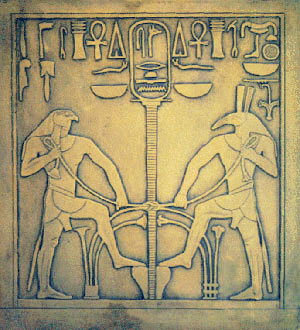|

by D.M. Murdock
September 14, 2009
from
Examiner Website
|
 D.M. Murdock, also known
as Acharya S, is an independent scholar of comparative
religion and mythology from a "freethinking"
perspective. D.M. Murdock, also known
as Acharya S, is an independent scholar of comparative
religion and mythology from a "freethinking"
perspective.
She is the author of
The Christ Conspiracy,
Suns of God, Who was Jesus? and Christ in Egypt. Her
work was featured in the movie Zeitgeist and Bill
Maherís Religulous. |
My friend Dr. Robert Eisenman, a
well-known Bible scholar, has just scored a major coup - albeit one
that may not be immediately recognized - in his article for the
Huffington Post entitled, "Redemonizing
Judas - Gospel Fiction or Gospel Truth?"

Dr. Robert Eisenman
In this essay, Dr. Eisenman - a main
mover behind getting the
Dead Sea Scrolls released to the
public - explores the propensity of scholars, journalists and other
writers to simply accept a priori the story of Jesus Christ in the
New Testament as factual and to proceed from there.
His analysis - "castigation" may be a
fairer term - is prompted by a recent
New Yorker article regarding
the Gnostic text "The Gospel of Judas," which created such a
brouhaha some years ago when it was given a great deal of publicity.
The Gospels as
"history?"
In his article, Eisenman approaches to the heart of the issue - one
that I have been writing about for almost two decades - in
describing his eloquent outburst at a National Meeting of The
Society of Biblical Literature, which he terms "the premier
organization in this field."
Rising at the end of a discussion of the
Gospel of Judas by various scholars, Eisenman remarked:
What makes you think any are
historical and not just retrospective and polemical literary
endeavors of a kind familiar to the Hellenistic/Greco-Roman
world at that time?
Why consider one gospel superior to the
another and not simply expressions of retrospective theological
repartee of the Platonic kind expressed in a literary manner as
in Greek tragedy?
The Gospel of Judas was clearly a
polemical, philosophical text but, probably, so too were most of
these others. Why not consider all of them a kind of quasi-Neoplatonic,
Mystery Religion-oriented literature that was still developing
in the Second Century and beyond, as the Gospel of Judas clearly
demonstrates?"
Eisenman next relates:
A sort of hushed silence fell on the
three hundred or so persons present in the audience, because
there was a lot of interest in this Gospel at that time, as I
continued:
'Why think any of them historical or even
representative of anything that really happened in Palestine in
the First Century? Why not consider all
Greco-Hellenistic romantic fiction or novelizing with an
ax-to-grind, incorporating the Pax Romana of the earlier Great
Roman Emperor Augustus, as other literature from this period had
and, of course, the anti-Semitism and anti-Jewish legal
attachments which were the outcome of the suppression of the
Jewish War from 66-73 CE?'"
As if that estimation were not enough,
Eisenman continued:
The Egyptians, Greeks, and Romans
were masters of such man/god fiction and the creation of such
characters as Osiris, Dionysus, Asclepius, Hercules, Orpheus,
and the like as the works of Hesiod, Euripides, Virgil, Ovid,
Petronius, Seneca, Apuleius, et. al. demonstrate.
Why not consider all of this
literature simply part of this man-God/ personification
literature, in this instance incorporating the new Jewish
concept of 'Salvation' - 'Yeshu'a'?"
Bravo, Dr. Eisenman!
In these three
pithy paragraphs, you have epitomized what I call, "The Christ
Conspiracy," the title of my first published book, subtitled, "The
Greatest Story Ever Sold."
Jesus
Mythicism in a nutshell
This thesis, which is called "Jesus Mythicism," evinces that the
Christ myth was created by various factions in the Roman Empire,
based on certain mythical motifs concerning the numerous gods and
goddesses of antiquity, and largely for the purpose of uniting
Judaism and Paganism.

Horus and Set
As concerns the issue of Judas
specifically, when the subject is studied in depth, factoring in not
only the Jewish scriptures but also Pagan writings and traditions,
it is obvious that the Judas character is fictional, based on the
Jewish people as a whole and designed to play the "heavy" in an old
mythical drama predating the common era for centuries.
For example, "Judas" takes the role of
the Egyptian god Set/Seth in the Horus-Set battle, as outlined in
the Egyptian texts as well as the writings of Greek historian
Diodorus Siculus (90-27 BCE).
In his Antiquities of Egypt,
Diodorus recounted that Horus was killed by Set in the form of a
scorpion, after which the Egyptian solar deity was resurrected from
the dead.
As I discuss in my book
Christ in Egypt, Diodorus uses the
Greek verb anastesai to describe Horus's resurrection - the
very same word used in the later Christian texts to describe Jesus's
resurrection.
It is highly obvious from Eisenman's comments that this first-rate
professional scholar is well aware of the "Christ Conspiracy"
thesis, so to speak, and has worked it out quite well. The question
is, will other academicians follow suit by pursuing this most
rational explanation of the origins of Christianity?
Eisenman's motivation for expressing
this unpopular but logical viewpoint is clear:
Jews over the
centuries have been unfairly targeted and persecuted by being called
"Christ-killers," when in fact the entire story smacks of
a
fictionalized rehash of the myths of earlier gods, goddesses, heroes
and so on.
In the end, to continue this fallacious
perception of the gospel story as "history" represents a disservice
to all peoples, as such a position not only deludes but also
prevents us from knowing the true meaning behind the myths.
|

 D.M. Murdock, also known
as Acharya S, is an independent scholar of comparative
religion and mythology from a "freethinking"
perspective.
D.M. Murdock, also known
as Acharya S, is an independent scholar of comparative
religion and mythology from a "freethinking"
perspective.
